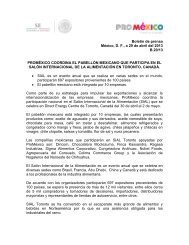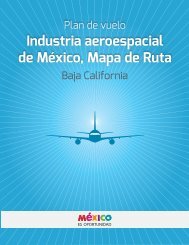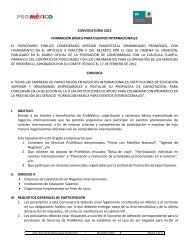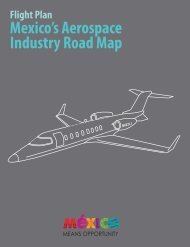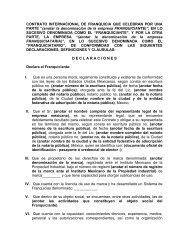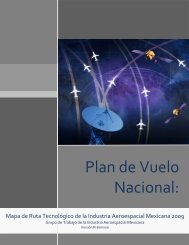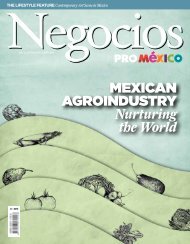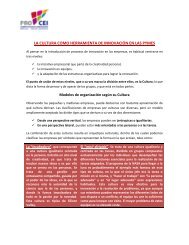ASiAn invASion wElcomEd - ProMéxico
ASiAn invASion wElcomEd - ProMéxico
ASiAn invASion wElcomEd - ProMéxico
You also want an ePaper? Increase the reach of your titles
YUMPU automatically turns print PDFs into web optimized ePapers that Google loves.
60 Negocios i The Lifestyle photos courtesy of unam<br />
UNAM, Awarded<br />
for its Influence<br />
in Ibero-America<br />
The National Autonomous University of Mexico<br />
(UNAM) has received the 2009 Prince of<br />
Asturias Award for Communication and Humanities<br />
in recognition of its influence on the<br />
Ibero-American culture and environment.<br />
The jury for the award, given since 1981<br />
by the Prince of Asturias Foundation of<br />
Spain, judged UNAM to be “the academic<br />
and formative model for many generations<br />
of students from diverse countries. It has<br />
nourished the Ibero-American environment<br />
of very valuable intellectuals and scientists.”<br />
The largest public university in Mexico<br />
and Ibero-America “has promoted powerful<br />
currents of humanistic, liberal and<br />
democratic thought in America and it has<br />
extended its decisive influence to create an<br />
extraordinary variety of institutions that enlarge<br />
the academic world and link it to the<br />
society they serve,” the jury said.<br />
UNAM was founded in 1910 as an institution<br />
of superior teaching that was the heir to<br />
the Royal and Pontifical University of Mexico,<br />
created in 1551. In 1929, Mexico’s government<br />
granted it autonomous status and the<br />
institution adopted its current name.<br />
It is Mexico’s most important public university<br />
and one of Ibero-America’s most<br />
important research and education centers.<br />
It has approximately 300,000 students and<br />
PRIZE WINNERS<br />
Mexican institutions and individuals who have winned the Prince of Asturias Award:<br />
• UNAM<br />
Communication and Humanities, 2009<br />
• El Colegio de México<br />
Social Sciences, 2001<br />
• Ricardo Miledi (neurobiologist)*<br />
Scientific and Technical Research, 1999<br />
• Carlos Fuentes (writer)*<br />
Writing, 1994<br />
• Francisco Bolívar Zapata (molecular biologist)*<br />
Scientific and Technical Research, 1991<br />
• Fondo de Cultura Económica (Editorial fund)<br />
Communication and Humanities, 1989<br />
• Marcos Moshinsky (physicist)*<br />
Scientific and Technical Research, 1988<br />
• Pablo Rudomin (neuroscientist)<br />
Scientific and Technical Research, 1987<br />
• Emilio Rosenblueth (seismic engineer)*<br />
Scientific and Technical Research, 1985<br />
• Juan Rulfo (writer)<br />
Writing, 1983 <br />
• José López Portillo (politician)*<br />
International Cooperation,1981<br />
more than 34,000 professors and researchers.<br />
From its classrooms have come Mexico’s<br />
three Nobel Prize winners - Mario Molina, in<br />
Chemistry (1995); Octavio Paz, for Literature<br />
(1990); and Alfonso García Robles; Peace<br />
Nobel Prize (1982). Also, six of the eight who<br />
have received the Prince of Asturias prize<br />
have graduated from this university.<br />
In the area of humanities, UNAM has<br />
been recognized for its openness to Ibero-<br />
American thoughts and ideologies and also<br />
as a home for distinguished thinkers and<br />
professors from around the world. Its humanities<br />
research centers, such as its institutions<br />
of historical, philosophical, philological<br />
and aesthetic investigation, have generated<br />
more than 2,700 books. Also, 16 specialized<br />
periodicals are edited in its schools.<br />
UNAM is in charge of administering the<br />
National Library and the National Newspaper<br />
Archive, as well as a network of 141<br />
university libraries. It’s also in charge of one<br />
philharmonic orchestra and a symphonic<br />
one; radio and television stations; Mexico’s<br />
most important film library, at the University<br />
Center of Film Studies (Latin America’s<br />
oldest film school); and a network of university<br />
museums.<br />
In 2007, UNAM’s main campus in Mexico<br />
City, was declared Cultural Patrimony of Humanity<br />
by UNESCO for being a monumental<br />
collection of 20th century modernism.<br />
Also, the university has several buildings in<br />
Mexico City’s historic center that have also<br />
been considered cultural patrimonies of humanity.<br />
The Prince of Asturias prize is awarded<br />
each year to eight people or institutions in<br />
the areas of art, international cooperation,<br />
harmony, social sciences, communication and<br />
humanities, sports, scientific and technical research<br />
and writing. n<br />
source: prince of asturias foundation<br />
* graduated from unam<br />
www.fundacionprincipedeasturias.org



